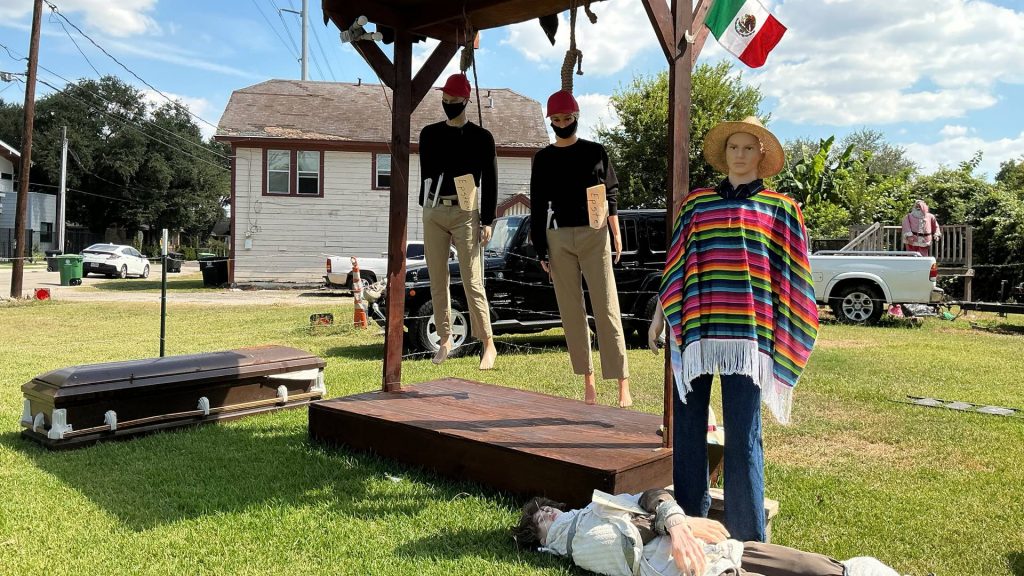Houston yard display of people hanging from nooses sparks free speech debate

A Houston yard display is sparking debate over the First Amendment and whether it crosses the line into inciting violence. The display features two people in red MAGA-like ballcaps hanging from gallows. Manila folders bearing the word “Epstein” poke from their pockets. Next to them is another mannequin wearing a poncho and a straw hat, along with two caskets and a Mexican flag.
Mark Rodriguez, the homeowner, told the Houston Chronicle and KPRC Local 2 News that he feels the Hispanic community lives in fear in his neighborhood because of ICE.
“This is my political statement,” Rodriguez told KPRC. “Our community lives in fear right now.”
In Rodriguez’s Houston neighborhood, 88% of residents are Hispanic, according to the latest 2023 census data.
“By no means am I threatening nobody’s life,” Rodriguez told the Chronicle. “This is part of my First Amendment to express how I feel as long as I am not hurting nobody or threatening nobody.”
While the hanged mannequins in the display have widely been interpreted as ICE agents, Rodriguez told Reuters, “Those are not ICE agents. Those are just people that have red hats and wearing masks.”
Online reactions
The online response has been swift and intense, with social media users questioning the legality of the display.
“This should be immediately taken down for inciting violence, especially in light of what’s happening in America today,” one X user wrote.
Another called it “a clear hate crime,” while a third commented, “This isn’t celebrating Halloween. It’s celebrating political violence.”
Roger Gonzales, a neighbor who has lived in Houston’s Second Ward community for more than half a century, told Straight Arrow News that the display reflected the property owner’s personal choice.
“It’s according to their own belief,” Gonzales said. “If you believe it, you know, free will. We live in the land of freedom. We have freedom in this country. So you can celebrate whatever you want to celebrate.”
Rodriguez told Reuters that while there have been mixed reactions, most of them have been positive.
“I’m getting some positive, some negative,” Rodriguez said. “I mean a lot of my neighbors love it. I have not got one person to come with a negative vibe around here. Because all I’m doing is practicing my First Amendment rights.”
Legal perspective
Displays depicting people are called effigies, and are generally protected speech, said Greg Magarian, a professor at Washington University’s School of Law in St. Louis, who specializes in First Amendment law.
“That’s what effigies are,” Magarian told SAN. “It’s a form of speech that goes way back. Whatever you might think of it, it is protected by the First Amendment.”
Local rules can sometimes regulate banners, yard displays or the size of decorations, according to Magarian. However, the homeowner told local news outlets he confirmed with local police that no such restrictions apply in this neighborhood.
Relevant Supreme Court cases
This is hardly the first time an American lawn display has caused concern. Magarian pointed to a 1992 Supreme Court case in which a teenager burned a cross on a Black family’s lawn. The action ran afoul of a city ordinance that banned symbols that “provoke anger” based on race, religion, or gender. The Supreme Court ruled the ordinance unconstitutional, stating that hate speech alone is not automatically illegal and is protected under the First Amendment.
“The Supreme Court said you can’t do that,” Magarian told SAN. “You can’t restrict speech because of its message, even if the message is really awful.”
A little more than a decade later, the Supreme Court ruled that the act of cross-burning, while protected as free speech, cannot automatically be taken as evidence of an intent to intimidate. That 2023 case, Virginia v. Black, helped further differentiate between offensive or hateful messages and direct threats, Magarian said.
“That ‘true threat’ exception is really narrow,” Margarian told SAN. “It’s a really hard thing to prove. It might be horrible to say, but you’re allowed to say ‘I think that person deserves to die.’ What you’re not allowed to do is go up to someone and say ‘I’m going to kill you.’”
While the lawn display has spurred plenty of online conversation, there is no legal action being taken against the homeowner. And if a challenge did arise, Magarian told SAN he believes the homeowner would likely have legal protection.
“I am strongly confident any court doing its job properly would look at this and say this isn’t a true threat of violence directed at a specific person,” Magarian said. “This is a strong, perhaps unduly harsh, but First Amendment-protected political message.”
The post Houston yard display of people hanging from nooses sparks free speech debate appeared first on Straight Arrow News.





